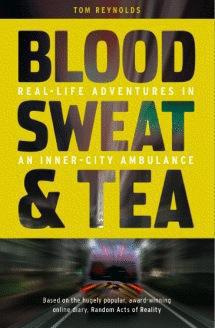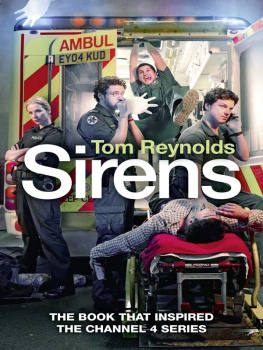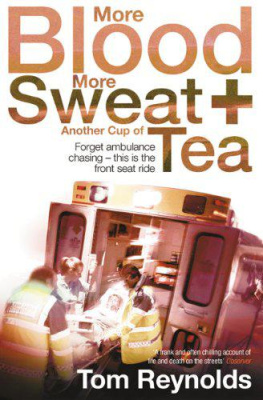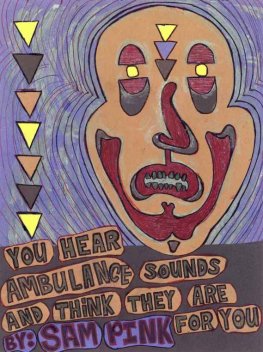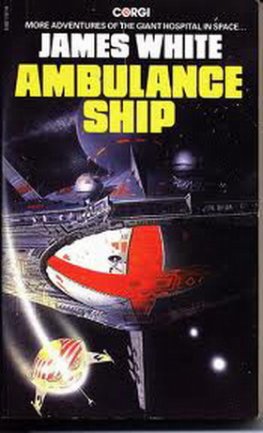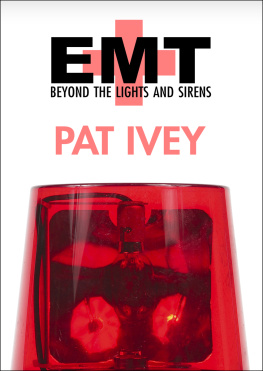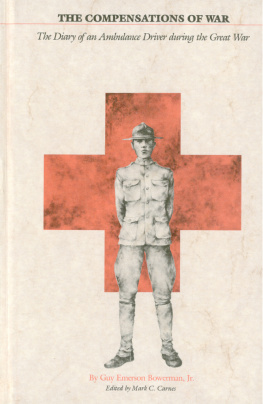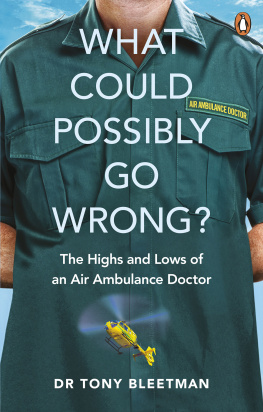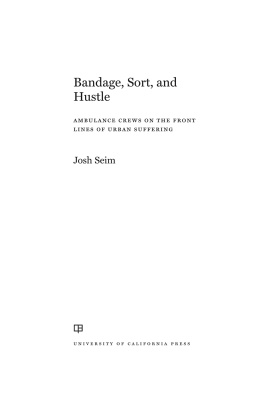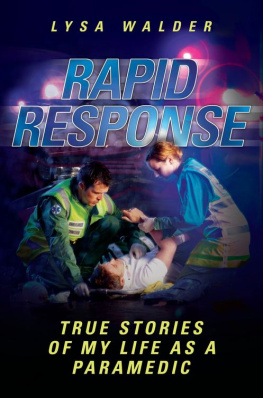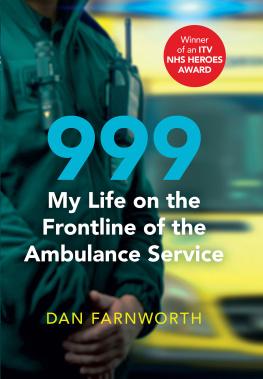
A note from the publisher...
Welcome to the Creative Commons edition of Blood, Sweat & Tea.
The following pages contain the complete, unabridged text of Tom Reynold's debut book, Blood, Sweat & Tea: real life stories from the London Ambulance Service. The book is based on Tom's award-winning blog: http://randomreality.blogspot.com
The paperback version of Blood, Sweat & Tea is available via Amazon, and in all good bookshops. ISBN: 1 905548230
Creative Commons is a special licence that allows readers to use copyright material in specific ways without affecting the author's overall copyright in the work.
Under the terms of this book's licence, you are free to make copies of all or part of this work for your own personal use and for other non-commercial use. You may annotate or edit the work in any way, and republish it online in any format, providing any annotated and edited version includes a link back to the source material at http://www.fridaybooks.co.uk/bst
You may also make derivative works (Flash animations, videos, images etc, etc) based on this text for online, non-commercial use only.
Any annotated, edited or derivative version must be made available under the same Creative Commons licence as the original material. The publishers reserve the right to revoke the Creative Commons licence at any time.
If you would like to make commercial, or offline use of material from Blood, Sweat & Tea or have any other questions, please contact bst@thefridayproject.co.uk and we'll be happy to help.
This work is licensed under the Creative Commons Attribution-NonCommercial-ShareAlike 2.5 License. To view a copy of this license, visit http://creativecommons.org/licenses/by-nc-sa/2.5/ or send a letter to Creative Commons, 543 Howard Street, 5th Floor, San Francisco, California, 94105, USA.
Enjoy the book!
The Friday Project
***
BLOOD,
SWEAT
& TEA
Creative Commons Edition
Tom Reynolds
Published by The Friday Project http://www.thefridsyproject.co.uk
***
Too Young
Yesterday started well, we had the only new 'yellow' vehicle on the complex, and it really is an improvement on the old motors. But then we got a job that should have been routine, but unfortunately was not.
We were given a '34-year-old male, seizure' at a nearby football pitch in the middle of a park. Also leaving from our station was the FRU (a fast car designed to get to a scene before the ambulance). As we had a new motor, we were able to keep up with the FRU.
Arriving at the top of the street, we were met and directed by some of the patients football team-mates. Unfortunately, the patient was 200yards into the park, and there was no way we were going to get the ambulance onto the field - the council had built a little moat around the park to stop joyriders tearing up the grass in their stolen cars.
The FRU paramedic had reached the patient first and I ran across the field to get to the patient as the Paramedic looked worried, and this isn't someone who normally worries.
As I reached the patient, carrying the scoop which we would use to move the patient the paramedic asked me if I thought the patient was breathing.
The patient was Nigerian, and it is not racist to say that sometimes detecting signs of life on a black person is harder than if the patient is Caucasian. White people tend to look dead; black people often just look unconscious. Also, a windy playing field in dusk is not the ideal circumstance to assess a patient.
'He's not breathing' I told the paramedic, just as my crewmate reached us. 'Shit' replied the paramedic, 'I left the FR2'* in my car'.
I had to run 200yards back to our ambulance to get this, now vital, piece of kit.
*An FR2 is a defibrillation machine, which is used to shock a heart back into a normal rhythm, in the UK emergency medical technicians (EMTs) are allowed to use this piece of equipment, and rapid defib' shocks are essential in certain forms of cardiac arrest.
Returning to the patient my colleagues had started to 'bag' the patient (this means using equipment to 'breathe for' the patient and performing cardiopulmonary resuscitation, or CPR), which is the procedure to keep blood flowing around the body in the absence of a pulse. Attaching the defib' pads I saw that the patient was in 'fine VF' (ventricular fibrillation) - this is a heart rhythm which means the heart is 'quivering' rather than pumping blood around the body to the brain and other vital organs. Technically, the patient is dead and without immediate treatment, the patient will remain dead.
We 'shocked' the patient once and his heart rhythm changed. It changed to asystole (this means that the heart is not moving at all, and it is much more difficult to restore life to the patient with this form of rhythm). We decided to 'scoop and run' to the nearest hospital. The paramedic secured the patients airway by passing a tube down the windpipe, and we got the patient onto the scoop, all the time continuing the CPR and giving potentially lifesaving drugs. We then carried him, with the help of his team-mates to the ambulance and rushed him to hospital.
Unfortunately, the patient never regained consciousness, and died in the resuscitation room.
Thirty-four years old, normally fit and healthy - and he drops dead on a football pitch. Despite our best efforts there was nothing more we could have done for him; the treatment went according to plan and the resuscitation attempt went smoothly. This was a 'proper' job, but one job we would have happily done without.
Why Won't They Let Me Do This?
Here is a moan about something that I am not allowed to do. I'm not allowed to run people over in my job. I could really clear the streets of a lot of stupid people if I was able to do that.
Picture the scene: there I am, driving through the streets of London in big white van, with blue flashing lights, loud sirens running and the word Ambulance written in rather large letters. As a pedestrian, what would you do? Would you think 'Hmm, being run over by that would really hurt, I think I'll wait the 12nanoseconds that it takes him to drive past before I cross the road'. Or would you, as most of the people in my area apparently do, think 'Hmm, an Ambulance on his way to an important job, I bet I can run across the road in front of him before he can hit me'.
During the last job, three people tried to dive under my ambulance. If I was allowed (by government grant or some such) to keep driving and splat them across my windscreen, that would mean three less idiots being allowed to breed tonight.
Oh well, I might get lucky later tonight.
Dear Mr Alcoholic
...Can all alcoholics please just get drunk in their houses and fall asleep there? Why do you insist that you drink your Tennent's Super in a public place where some do-gooder will think you are ill and call for an ambulance.
...Can you also have a bath once in a while? I know it's nice to roll around in the road while drunk, but it would be nice if you were at least a bit clean to start with.
...Would you mind awfully if you don't swear at me, take a swing at me or expose yourself to me. I have quite enough abuse from the non-drunks out there... Still at least your fists are easy to dodge, and if I stop holding you up, you fall over.
...If you have a medical condition, please don't use it as an excuse to get taken into hospital. If you tell me 'I'm drunk and need to sleep it off', I have less work to do than if you tell me that you have 'Chest pain, Angina, Cancer and Difficulty in Breathing'. The more tests I have to do the longer it will be before you get to hospital, and the more I have to come into physical contact with you. If you are just drunk, then I can just be a taxi.
Next page
